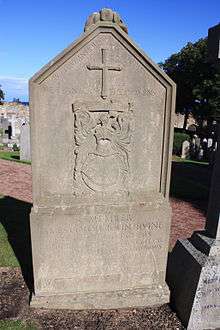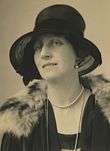James Irvine (chemist)
| Sir James Irvine | |
|---|---|
 | |
| Born |
9 May 1877 Glasgow |
| Died | 12 June 1952 (aged 75) |
| Resting place | St Andrews |
| Nationality | Scottish |
| Fields | Organic chemistry |
| Institutions | University of St Andrews |
| Notable awards |
Davy Medal (1925) Willard Gibbs Award (1926) Elliott Cresson Medal (1929) |

Sir James Colquhoun Irvine KBE FRS[1] FRSE FEIS (9 May 1877 – 12 June 1952) was a Scottish organic chemist and Principal and Vice-Chancellor of the University of St Andrews from 1921 until his death. As a research chemist, Irvine worked on the application of methylation techniques to carbohydrates, and isolated the first methylated sugars, trimethyl and tetramethyl glucose.[2][3]
Life
Irvine was born in Glasgow to factory-owner John Irvine (a manufacturer of light-castings) and Mary Paton Colquhoun. He was educated at Allan Glen's School.[4]
He then studied at the Royal Technical College, Glasgow, before taking a Bachelor of Science in Chemistry at the University of St Andrews. From there, he went to the University of Leipzig, where he studied for a Ph.D. under Ostwald and Wislicenus. Returning to St Andrews, he was awarded a Doctor of Science degree, and taught Chemistry there. He was appointed Professor of Chemistry in 1909 and Dean of Science in 1912. In 1921, he was appointed Principal. His tenure saw the renovation and restoration of both buildings and traditions, and his works are still talked of today. His commitments spanned further than the University, into higher education in Britain and the colonies. He also served as acting Principal of University College Dundee.[5]
He was elected a Fellow of the Royal Society of Edinburgh in 1917 and a Fellow of The Royal Society of London in 1918. He served as Vice President of the Royal Society of Edinburgh from 1922 to 1925. He won the society's Gunning Victoria Jubilee Prize for 1936-1940.[6]
He received honorary doctorates from the Universities of Aberdeen, Cambridge, Columbia, Durham, Edinburgh, Glasgow, Liverpool, McGill, Oxford, Princeton, Toronto, Wales and Yale.
He died at home in St Andrews on 12 June 1952 and was buried in the eastern cemetery close to the main lower entrance gate.[6]
Family

Irvine married Mabel Violet Williams in 1905.
References
- ↑ Read, John (1953). "James Colquhoun Irvine. 1877-1952". Obituary Notices of Fellows of the Royal Society. 8 (22): 458. doi:10.1098/rsbm.1953.0011. JSTOR 769223.
- ↑ Hirst, E. L. (1953). "James Colquhoun Irvine, 1877-1952". Advances in carbohydrate chemistry. 8: xi–xvii. doi:10.1016/S0096-5332(08)60096-X. PMID 13138381.
- ↑ Read, J. (1952). "Sir James Irvine, K.B.E., F.R.S". Nature. 170 (4314): 13–14. doi:10.1038/170013a0. PMID 14957005.
- ↑ Waterston, Charles D; Macmillan Shearer, A (July 2006). Former Fellows of the Royal Society of Edinburgh 1783-2002: Biographical Index (PDF). I. Edinburgh: The Royal Society of Edinburgh. ISBN 978-0-902198-84-5. Retrieved September 25, 2010.
- ↑ Shafe, Michael (1982). University Education in Dundee 1881-1981: A Pictorial History. Dundee: University of Dundee. p. 204.
- 1 2 https://www.royalsoced.org.uk/cms/files/fellows/biographical_index/fells_indexp1.pdf
| Academic offices | ||
|---|---|---|
| Preceded by Sir John Herkless |
Principal of University of St Andrews 1921 – 1952 |
Succeeded by Sir Thomas Malcolm Knox |
| Preceded by John Yule Mackay |
Principal of University College Dundee 1930 – 1939 |
Succeeded by Angus Robertson Fulton (interim) |